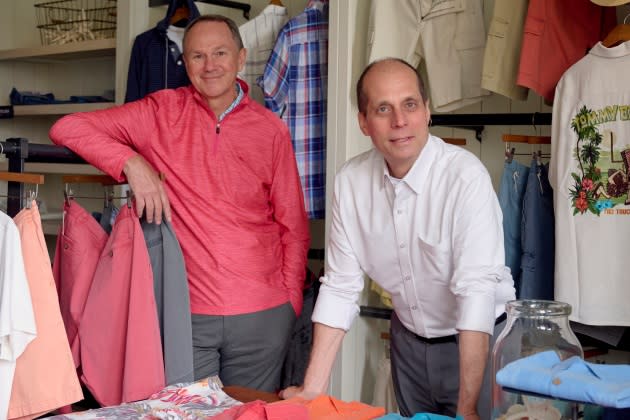Tommy Bahama Milestone: Retail, Wholesale Channels Collaborate for the Greater Good

Peter Leff and Joel Gardner should be at loggerheads.
As the heads of Tommy Bahama’s wholesale and retail divisions, it wouldn’t be surprising if they viewed each other as competitors. Instead, they work closely together as collaborators.
More from WWD
“That’s the uniqueness of our operation,” said Gardner, executive vice president of retail. “We share a lot of information, we share building the assortments together.”
Leff, executive vice president of wholesale, added: “We’re competing for the same thing and have the same goal: regular-price sales.”
In the beginning, Tommy Bahama was strictly a wholesale brand, but the changing retail climate and the closure of former customers such as Lord & Taylor prompted a dramatic pivot in emphasis to focus more on the company’s 158 full-line and outlet stores as well as online selling. Today, wholesale accounts for just 15 to 17 percent of the company’s overall volume.
Even so, some high-profile retail customers remain, including Nordstrom, Dillard’s, Van Maur, Saks Fifth Avenue, Neiman Marcus and Bloomingdale’s, as well as more than 1,200 specialty stores.
“We’re very sensitive to partnering with retailers that can sell our brand at regular price,” Leff said.
The company’s outlets are primarily used to sell off any excess inventory, Gardner said, and the company also has relationships with Nordstrom Rack and T.J. Maxx to get rid of goods if necessary.
In the full-line stores as well as at partner retailers, the assortment is nearly identical, they said. Leff said the two teams meet throughout the season to ensure they are aligned on the parts of the collection. And while there are a few styles that are wholesale or direct-to-consumer only, the majority are the same.
“The more we can align, the more successful we’re going to be,” Leff said, as the marketing efforts for the brand as a whole are able to address both channels.
While the brand is best known as a men’s label, its women’s collection has been gaining in importance in recent years.
“We’ve been striving to grow the women’s business for a number of years now,” Gardner said. “And we’re seeing some really nice improvement.”
Leff added: “We‘ve had significant double-digit increases in women’s at wholesale for the last few years. It’s an extremely healthy business right now.”
Another benefit of wholesale is that it provides valuable feedback on what’s selling that can be shared with the company’s own direct-to-consumer operation. And if a wholesale market is especially strong, it may indicate that a Tommy Bahama retail store would also perform well there. “Our belief is that all boats will rise,” Gardner said. “We’ve seen that the amount of business we’ve added in markets where we’ve opened stores actually added to our wholesale accounts because it gives us more brand exposure within those markets.”
Both Leff and Gardner work closely with the digital division to ensure what is being sold online is similar to that being sold in physical retail locations.
“It used to be a lot more siloed,” Leff said, “but we’ve worked hard to make sure we’ve got a unified voice.”
While the assortment online is broader than that sold at the stores, for the most part the top-selling pieces are the same at all channels. But one of the advantages of marketing digitally, Gardner said, is that it allows the company to focus in on a particular product or category — something that is harder to do in a physical store.
“The beauty of e-commerce is you can be very clear to the guests,” he said. “You can show them what you want them to know right now through an email, homepage or landing page. And when we do that, the sales are tremendous.”
Online also allows the company to offer an assortment of its licensed products, such as outdoor furniture, baby strollers, coolers, gazebos, comforters and shower curtains, that may not fit in a store.
So what will the future hold for the retail and wholesale divisions of Tommy Bahama?
For Leff, he believes his division can continue to grow. “There’s still some untapped opportunity out there with our existing clients,” he said. “We are a healthy and profitable contributing business that is not slowing down.”
As for retail, Gardner said the company is “definitely looking for growth opportunities” for its successful smaller restaurant concept, the Marlin Bar, which is attached to a store and will provide the brand as a whole with added exposure.
“We’re not just about selling a shirt,” he said. “We are a lifestyle brand and we want you to experience more of that. Even though we’re 30 years into it now, we’re still young as it relates to really harnessing the power of the brand. As long as the product continues to evolve and the guest accepts it, there’s a lot of room for us to grow.”
Sign up for WWD's Newsletter. For the latest news, follow us on Twitter, Facebook, and Instagram.
